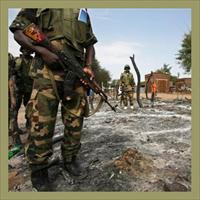DR Congo: Action must replace European ‘air-miles’ diplomacy as ceasefire breaks

EU foreign ministers meeting in Brussels today (Monday, 10 November) must provide clear commitments to send European troops to support the UN in eastern Congo, said international agency, Oxfam.
The fragile ceasefire is now broken, forcing thousands of people to flee again in fear and seriously jeopardizing the ability of aid agencies to help them. The UN’s peacekeeping force, MONUC, has struggled to ensure the peace and keep the people safe, with an estimated quarter of a million people forced from their homes due to recent fighting.
Juliette Prodhan, head of Oxfam in the Democratic Republic of Congo said: “The French and British Foreign Ministers flew from Kinshasa to Goma to Kigali to Dar Es Salaam last weekend and made clear calls for urgent military reinforcement of the UN troops, but absolutely nothing has changed on the ground. Instead of ‘air-miles’ diplomacy we need action. Leaders cannot make this call, then fail to follow through with action to protect civilians.”
Since the Ministers visited the region, tens of thousands more people have fled as fighting has surged again in Kiwanja and Rutshuru. On Friday, shelling around Kibati camp, 5kms north of Goma – where Oxfam is working – caused thousands of civilians to flee towards Goma town. After a night of hiding in host families and in schools and churches, most appeared to have returned to the camp, but remain scared and vulnerable. The situation is still tense with just 200 meters between the Congolese government and rebel positions. In Kanyabayonga – where Oxfam is also working – thousands more fled on Saturday as the Congolese army retreated from positions around Rutshuru.
“We hear excuse after excuse from European countries about why they can’t help and they pass the buck to another country, another continent. Their inaction has very human consequences, as the thousands that fled Kibati and Kanyabayonga could tell them. 5.4 million people have died over the last 10 years. How many more must suffer before Europe will take effective action? The international community is failing in its Responsibility to Protect civilians in eastern Congo,” said Prodhan.
Deployment of European troops must be combined with sustained diplomatic pressure to achieve a political solution and address the underlying causes of the conflict.
The European Union is well placed to rapidly provide the additional troops. It has a history of successful peacekeeping in Congo and through its mission in Chad, Europe has shown it can play a vital role in protecting civilians. European countries currently contribute just 100 of the 17,000 UN troops in Congo. MONUC is the largest peacekeeping force in the world but in a country the size of Western Europe, was already stretched before the recent round of intense fighting began. UN peacekeeping chief, Alain le Roy, first appealed for more troops in September – and has appealed again in recent days.
Redeploying troops from elsewhere in the Kivu provinces and eastern Congo is not the solution as other parts of the region are also insecure and in danger of all-out conflict. To do so would leave civilians elsewhere vulnerable to attack. In Ituri and Dungu in the northwest Orientale Province thousands have been forced to flee an upsurge in fighting, including 57,000 in recent attacks on 1 and 2 November.
Oxfam is also calling for practical steps to be taken to improve the current performance of MONUC. Without better leadership and a genuine commitment to address both the immediate crisis and the factors that have created it, even with additional troops MONUC risks achieving very little.
There is not a military solution to this conflict nor can it be solved simply by providing more troops or military hardware. However, if done properly, additional military support could help improve security, protect civilians and allow aid agencies to provide help to all those that desperately need it.
“European Ministers must seize the opportunity, working with colleagues from the United Nations and African Union, to push for a political solution, commit to military support to protect the people and ensure that the world does not look away from Congo as it has done so many times before,” said Prodhan.
Additional Notes:
In 2005 at the UN World Summit almost every government in the world agreed that they had a ‘Responsibility to Protect’ their people from genocide, war crimes, ethnic cleansing and crimes against humanity, and that the international community also has a responsibility to help - firstly to support governments in doing so, and secondly, to act if any government fails to protect its own citizens.
 Back and Next - Back and Next
Back and Next - Back and Next See Also - See Also
See Also - See Also